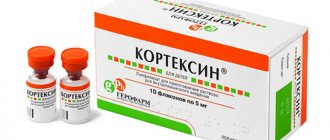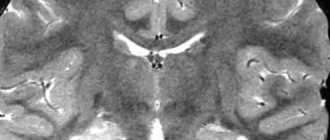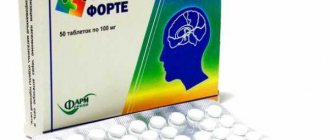Glycine - indications for use
Due to its large number of properties, this drug is widely used during pregnancy. Glycine is often present as part of a therapeutic complex:
- chronic, intrauterine fetal hypoxia (more about fetal hypoxia during pregnancy>>>);
- placental insufficiency;
- vegetative-vascular dystonia of a pregnant woman;
- complications during pregnancy, characterized by swelling, high blood pressure, damage to the nervous system;
- neuroses that manifest themselves in an emotionally labile pregnant woman;
- Glycine during early pregnancy is prescribed for complications with bearing a child.
This drug is recommended during pregnancy, as
- Does not settle in tissues, therefore, overdose is practically excluded;
- It also easily penetrates the tissues and organs of both mother and baby (it easily passes placental and hematoencephalic protection in the brain and spinal cord);
- It contains: organic amino acids, which easily break down in the body into simple components;
- It should be added that the benefit of glycine during pregnancy is that the components of the drug take an active part in membrane stabilization, restoring damage to its walls;
- Glycine undergoes microsynthesis in the body and turns into the amino acid serine (the main component of the cell membrane);
- The second most important property is detoxification (neutralization) of harmful substances in the body during pregnancy. It is believed that this is what affects the protection of nerve tissue.
Interesting Facts
Aminoacetic acid is used not only as a medicine. This common chemical compound is in great demand in a variety of industries. Here are some examples:
- Glycine is often used as a food additive labeled E640. It is added to drinks and even sports nutrition.
- As a pure chemical, aminoacetic acid is found in a wide variety of fertilizers, dyes, and even semiconductors—metals.
- Professional photographers use this acid as one of the most inexpensive developers.
- Aminoacetic acid is even used as an oxidizing agent for rocket fuel.
- Glycine is widely used in cosmetology. As part of moisturizers, it slows down the process of premature aging of the skin and protects it from external adverse factors.
- Glycine was found in the composition of silk thread, the so-called. silk fibroin. In addition, glycine is used to replace silk fibers in the soap making process. Thanks to this, it becomes smooth, shiny and non-irritating.
- This is the first non-essential amino acid that was isolated by hydrolysis of natural protein (which once again proves that this is not a synthetic drug at all).
Despite all the clearly expressed benefits of aminoethanoic acid, you should never drink it without consulting a specialist! It is an experienced doctor who must prescribe the required dosage and frequency of administration of the drug. The specialist's instructions must be strictly followed.
Do not self-medicate and respect your health!
The effect of glycine in the body of a pregnant woman
The drug regulates metabolic processes in the cells and blood vessels of the brain, restores protective inhibition in the fibers of nerve tissue, and prevents their destruction.
Glycine has an anti-stress effect on the body, neutralizing excitement and reducing the tone of nerve cells caused by adrenaline.
It also protects nerve cells from destruction and rapid depletion, which is very necessary for the nervous system of pregnant women.
Thanks to its sedative and anti-anxiety effects, it improves:
- mood;
- falling asleep and quality of sleep;
- mental and intellectual performance;
Qualitatively improving metabolic processes in brain tissue, it reduces:
- psycho-emotional stress;
- level of anxiety, aggressiveness, conflict;
- the severity of vegetative-vascular disorders provoked by hormonal fluctuations during pregnancy;
- manifestation of brain disorders after traumatic brain injury (even if the injury occurred a long time ago, hormone surges can cause the manifestation of its long-term consequences);
- toxic effects of drugs that suppress the functions of the nervous system and alcohol.
Why is the drug prescribed?
Due to changes in hormonal levels, a pregnant woman’s systems are adjusted to a new operating mode. The central nervous system is no exception. Outwardly, this may not manifest itself at all or, on the contrary, be expressed too strongly. Both in the direction of aggressiveness and in the direction of depression.
The administration of glycine during pregnancy eliminates such manifestations. Nervous tension, constant, often irrational, fears, poor sleep, lack of appetite - all this negatively affects the development of the baby. Therefore, the use of such a medicine is completely justified.
An experienced doctor, before prescribing a woman to take glycine during pregnancy, can advise her to establish a daily routine. It is equally important to monitor nutrition, sufficient exposure to fresh air, and physical activity. These measures often help cope with emotional instability. Herbal soothing teas work well.
If a doctor prescribes glycine, you can drink it during pregnancy without unnecessary fears. Why you cannot use this drug without permission can be seen from the table describing its advantages and disadvantages.
Where can I buy
This drug is available without a prescription. But at an affordable price you can only buy it on the iHerb website.
The online store is a supplier of supplements from America and Europe. It works without intermediaries, so it offers clients competitive prices. The cost may differ from the pharmacy price by 30-50%.
Attention! New iHerb customers receive a -10% discount on their first order. To purchase supplements at a reduced price, you must enter promo code AGK4375 or follow this link.
On the website you can also read reviews about the drug and choose a convenient delivery method. There is also a qualified support service here.
Can I take it during pregnancy?
There is no data on large-scale clinical studies of the effect of Glycine on the body and condition of pregnant women.
The practice of prescribing Glycine to pregnant women does not know of cases of negative effects on the pregnant woman, the fetus or the birth process, if the following conditions are met:
- the drug was prescribed by a doctor;
- the pregnant woman had no history of hypotension;
- blood pressure was monitored if hypotension was present;
- The pregnant woman did not take psychotropic, narcotic or sleeping pills.
The main thing is that Glycine is prescribed by a doctor; a competent prescription taking into account all the nuances of the patient’s clinical picture is the key to effectiveness and safety!
Possible adverse reactions and contraindications
Despite the wide range of therapeutic benefits, the drug Glycine cannot be taken in individual cases. Contraindications to the use of this product include:
- Previously occurring episodes of individual intolerance to the drug;
- Tendency to hypotension (low blood pressure).
In all other cases, this drug can be prescribed to expectant mothers. Side effects from consuming glycine are extremely rare. In a certain category of expectant mothers, the following adverse reactions are likely:
- Redness of the skin and the appearance of a rash like urticaria;
- Skin itching;
- Swelling of the oral mucosa;
- Decreased blood pressure levels.
Taking glycine in doses, an overdose is unlikely. To avoid negative reactions, medical experts do not recommend exceeding the dosage prescribed by your doctor and not using this medication for more than 30 days in a row.
In the early stages
In the earliest stages of pregnancy, namely in its first trimester, all the organs and systems of the baby are formed. This is an extremely delicate process that can be disrupted even by minor external influences. Such changes may subsequently manifest as congenital malformations in the baby. That is why in the first three months of gestation it is recommended to stop taking any of the safest medications.
There are no direct contraindications for the use of medication in the early stages of pregnancy, but if the patient’s well-being and mental state allow her to refuse drug therapy, then, of course, it is necessary to limit it if possible. You should not risk the health and life of your baby once again, therefore, even if you take this remedy, do it under the strict guidance of your doctor.
Table: differences between types of glycine
| Drug name | Mass of amino acids in 1 tablet | Peculiarities |
| Glycine | 100 mg | The classic composition is produced by the pharmaceutical company Biotiki. |
| Glycine Bio | 100 mg | The same classic composition, but produces the drug with the Bio prefix, which is a common marketing ploy. Glycine is a completely biological substance. |
| Glycine Forte Evalar | 300–500 mg | The additional content of B vitamins in this dietary supplement (BAA) enhances the effect of the drug on the nervous system. Not a medicine. Therefore, making an independent decision about admission is highly undesirable. |
| Glycine VIS | 200 mg | Its composition is similar to Glycine Evalar Forte and is also contraindicated for expectant mothers, being a dietary supplement. The effectiveness is not comparable with the possible effect on the fetus. |
| Glycine Canon | 1000 mg | This dose of an essential amino acid significantly exceeds the required amount for preventive purposes and conventional therapy, which is justified only for ischemic stroke. |
What can be dangerous during early pregnancy, in the 2nd and 3rd trimester?
Glycine is completely safe and has absolutely no effect on the intrauterine development of the fetus, so it can be taken during pregnancy both in the early stages and in the 2nd and 3rd trimester. But you should take into account some recommendations from experts:
- In the first trimester, the organs and systems of the unborn child are formed, so it is highly advisable to refrain from taking any medications during this period of pregnancy. In any case, starting a course of therapy on your own is strictly prohibited.
- In the second trimester, a pregnant woman may experience weakness, depression, and lack of appetite. Glycine tablets will help solve these problems. But you need to remember that for taking you should choose a drug whose name does not contain the prefix “forte”. The latter indicates the highest concentration of aminoacetic acid in the composition.
- In the third trimester, Glycine is absolutely safe for the fetus, but it will help the woman get rid of edema and prevent the development of oxygen starvation in the child. The drug will calm the expectant mother, relax her, and a positive attitude is important for the normal course of labor.
Is it possible to get by with food sources?
Amino acid deficiency affects the state of the nervous system, so it must be replenished either with medications or sources. Women carrying a child are recommended to use the latter option, as it is safer.
Table - Products containing aminoacetic acid
| Food sources | Content, mg/100 g |
| Egg white | 2,8 |
| Soya beans | 1,9 |
| Pumpkin seeds | 1,8 |
| Pig tongue | |
| Parsley | |
| Rabbit meat | 1,6 |
| Veal, beef liver | |
| Peanut | 1,55 |
| Pork liver | 1,5 |
| Mussels | 1,48 |
But these products will not be able to normalize the psychological state during frequent stress and severe hormonal imbalance. For such disorders, it is better to take a drug based on aminoacetic acid.










